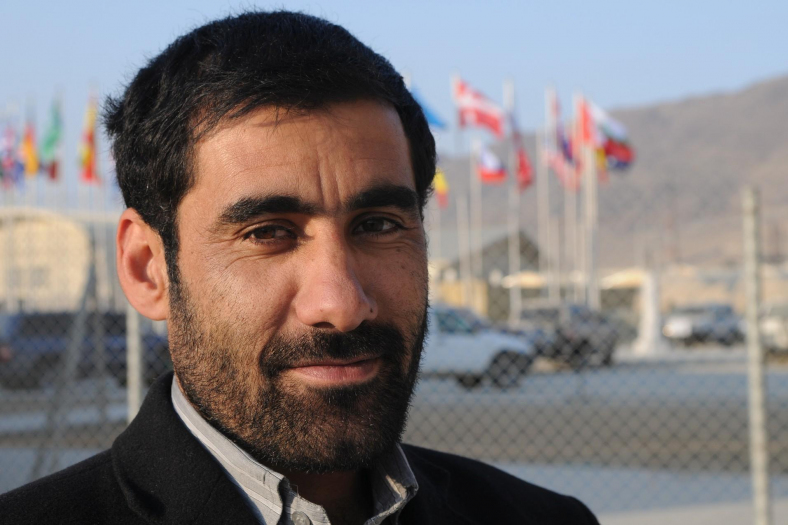Gie Goris was van december 1990 tot september 2020 voltijds actief in de mondiale journalistiek, eerst als hoofdredacteur van Wereldwijd (1990-2002), daarna als hoofdredacteur van MO* (2003-juli 20
‘Afghans anxiously await formation of new government’

Danish Karokhel
CC Gie Goris (CC BY-NC 2.0)
The situation in Afghanistan is uncertain and volatile, but is it as bad as Western media and politicians are stating? The truth is: we don’t know, yet. MO* spoke to Danish Karohel, director of Pajhwok Afghan News agency and one of the leading journalistic voices in Afghanistan. He and his team continue publishing, as long as they can. And the vow to fight for the right to do their work.
Karokhel has been running the Pajhwok Afghan News agency for almost twenty years. He is not happy with the silence in the country, however, as speaks loudly about the all too real shutdown of everything that matters, except traffic police and health services.
Who really rules?
For a week now, there has been a lack of clarity about who is running the country, and in fact, no one is doing so for the time being. Ministries are at a standstill, civil servants are sitting at home, the economy grinded to a halt, the population is holding its breath. For the time being this also means that there is no systematic persecution of human rights activists.
Karokhel hopes that in the next few days there will be a breakthrough in the formation of a government of national unity — talks between the Taliban and politicians from the previous regime such as Hamid Karzai and Abdullah Abdullah are ongoing. When that government is in place, work can begin on rebuilding or restarting the country.
The emphasis on Islam and national unity before independent reporting casts a shadow of the expected policy ahead.
Does he not fear that new rules and especially new restrictions on citizens and journalists will also start being formulatd then? That the dreaded persecution of human rights activists and outspoken critics of political Islam will then really take off? Certainly he does.
The announcement at the first press conference with Zabihullah Mujahid was vague and not too reassuring, Karokhel says. The emphasis on Islam and national unity before independent reporting already casts a shadow of the expected policy ahead.
Taliban too busy
Right now, the Taliban are too busy to interfere. They are trying to set up a government, they are busy collecting the government’s cars, and they are confiscating weapons whenever possible. But if they manage to maintain order and organize a government, the rules will become clear. The chances that those rules will be welcomed by journalists, or activist, democrats or free-thinking citizens, are very small indeed.
In recent days, Pajhwok has not stopped its regular critical reporting. The agency published a report of a protest in Jalalabad, in which shots were fired at the protesters — including footage of a victim. ‘No one has visited the office, no one has called us about this,’ Karokhel says. He is not reassured that this will continue, but is willing to fight for it.
Divided they’ll rule
The way Taliban fighters behave in the streets of Kabul, the way the movement’s top brass has negotiated with the U.S. and the attention it pays to its international reputation suggest that the Taliban will be better prepared to govern Afghanistan in 2021 than in 1996, when it first captured Kabul. Yet Danish Karokhel is not convinced.
Taliban is made up of 5 or 6 factions. That can lead to a power struggle that would drag the country down with it.
‘To begin with, the Taliban are more divided internally today than they were in the 1990s. Then there was no discussion about Mullah Omar’s position and everyone was on the same page. Today we are talking about at least five, six factions. They all have their own leaders, convictions and interests. So it could soon come to a power struggle between them that would drag the rest of the country down with it.’
‘In the 1990s the Taliban took over an impoverished country of some twenty million people. Today there are at least 35 million inhabitants, and there is a young generation that has studied and is cultivating its own high expectations. It is difficult to imagine how the new government will meet these expectations without an economic plan and with a political vision based on prohibitions and restrictions. Especially if it fails to restore relations with the international community, it risks ending up in a humanitarian disaster, and organized resistance will certainly emerge from that.’
They should never walk alone
Conclusion? The first task for the new leaders is to form a government that enjoys broad support and to set about creating good governance as quickly as possible. ‘The Taliban cannot do that alone, and certainly not if they continue to appoint one mullah after another as governor or head of the university or soon to be ministers.’
Karokhel says he could live with a kind of provisional administration, in which people are brought together to work on a new constitution or draw out the new form of state. For him, the condition for accepting such a transitional period is always that real experts are involved, and that the transition is not stretched.
Maak MO* mee mogelijk.
Word proMO* net als 2793 andere lezers en maak MO* mee mogelijk. Zo blijven al onze verhalen gratis online beschikbaar voor iédereen.
Meer verhalen
-
Report
-
Report
-
Report
-
Interview
-
Analysis
-
Report











 Oxfam België
Oxfam België Handicap International
Handicap International